Sleep Quality For Runners
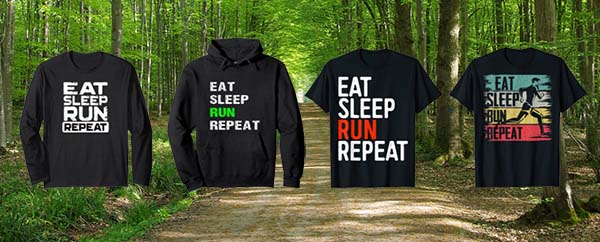
‘Eat, Sleep, Run’ – the classic runner’s motif splayed across t-shirts, hoodies and mugs, guaranteed to raise a knowin smile & nod from fellow runners. And yet, how much do we truly live by that motto? We watch what we eat, we take care in organising our running sessions… but how much do we do we actually focus on our sleep, in particular sleep quality?
Of the runners I see via online consultation who are struggling with pain, injury and or performance issues, an increasingly common factor that we find when working through things together is the presence of poor sleep quality and/or quantity.
This should not really come as a surprise as modern research suggests that many of us (whether runners or not) have over the years become accustomed to living sleep-deprived lives, but for regularly active folk like runners the problem is often either missed or not addressed.
Why Do We Sleep?
Most of us have grown up to believe that sleep is a time for the body to awitch off, conserve energy, operate on ‘minimum system requirements’ in preparation for another busy day tomorrow. As a result, we believe robbing a few hours here and there during the week is fine, especially if that’s the only way to fit those all important running sessions in around work and family.
However, modern sleep science research is revealing that the truth of what services sleep provides is far more complex. Rather than seeing sleep as the third pillar of success along with nutrition and exercise, we are now discovering that sleep forms the foundations for every living process that occurs in our body.
Putting aside for one moment the effect that poor sleep quality/quantity can have on running injury & performance, studies are joining in unison to show that routinely sleeping less than 6 hours a night can:
- weaken our immune system
- increase risk of certain types of cancer
- increase risk of Alzheimer’s disease
- increase risk of cardiovascular disease
- increase risk of a stroke, diabetes and obesity
Our internal circadian rythhm does not exist to simply ‘prompt us’ to recharge our batteries when we get a chance. The intricate processes of melatonin release and adenosine sleep pressure are finely tuned to ensure that each of the vital processes carried out in the various stages of sleep are executed correctly.
To give you an idea of how vital these processes are, studies have shown that:
- airplane cabin crew subjected to persisent sleep disruption due to jet lag have shrunken parts of brain relating to learning and memory, and significant short term memory loss.
- night time shift work is linked to increased risk of Type 2 Diabetes, and Cancer.
Sleep is most certainly not a state of minimum activity. During its stages, thousands of brain cells are synchronised to fire at the same time as recent experience memories are transferred to safer long term storage location. During REM sleep (see on), our brian waves are almost exactly the same as when we are awake. In fact, MRI studies show that some parts of the brain are 30% MORE active when we are in REM stage compared to awake!
Though our voluntary muscles become paralysed each night, our brain works relentlessly in an effort to ensure we are physically and mentally stronger each time we wake up.
Sleep Quantity
Given the importance of sleep to everday mental and physical functioning, it should come as no surprise that poor sleep can hinder running performance and reduce both resilience to and recovery from injury.
Studies show that consistently training on fatigued legs can increase the risk of injury. This presents a problem for runners because ‘working through fatigue’ is something we learn to do, especially if preparing for the gruelling demands of an up & coming race.
However, I would suggest the answer here is not solely focussing on what you do in the training session, but also ensuring that your recovery between sessions is optimum, and that is obviously where sleep quantity and quality come into play.
Have you ever, for example, tried to squeeze in a run before a busy day at work, setting your alarm to make the most of the dawn hours? Though your intentions are good, chances are by doing so you are reducing your night’s sleep to less than the recommeded 7-9 hours, and as a result basically ‘robbing Peter to pay Paul’.
Unless you are getting the necessary recovery, that training session will have little positive effect on your overall goals, and could even increase risk of injury.
Sleep Quality
How about those of you who are getting the recommended 7-9 hours of sleep a night but still feeling sleep-deprived during the day? This could be because your quality of sleep is the issue. The list below shows common signs that you are not achieving sleep quality:
- You feel sleep-deprived despite getting 7-9 hours sleep.
- It takes you more than 30 minutes to fall asleep.
- It takes you less 5 minutes to fall asleep.
- You wake up more than twice during the night.
- It takes you longer than 20 minutes to fall back asleep after waking up during the night.
- You depend on caffeine to get you through the day.
To understand how quality of sleep can become an issue, we need to take a look at the different stages of sleep and what they do, something that modern sleep research is thankfuly allowing us to start doing.
The Stages of Sleep
Modern Sleep Science has managed to start understanding far more what is happening within the different stages of sleep. Some of you reading this may already be aware of the terms ‘Non-REM Sleep’ and ‘REM sleep’.
Non-REM Sleep
Non REM Sleep is composed of three different stages:
- Non REM 1: the lightest stage of sleep, taking up about five percent of our sleep time across the night.
- Non-REM 2: takes up about fifty percent of our sleep time across the night so it’s a very broad category.
- Non-REM 3: the deepest stage of sleep – where growth hormone is released and tissues pushed by the demands of running are repaired.
Runners should take note of Non-REM 3 – the deepest stage of sleep where growth hormone is released. The more you train, the more Non REM 3 stage you need. There are also processes enhancing your memory during the non-REM 3 stage, referred to as ‘pruning memory’. Basically, this is where you get rid of memories you don’t need and consolidate memories you do, something that is of extreme importance with regards to the learning of new skills.
Interestingly, much of the deep sleep (Non-REM 3) occurs in the first half of the night whereas most of the REM sleep (see below) occurs in the last half of the night. In other words, if you want to get the most recovery possible, avoid going to bed late. That first half of your eight hour night could be crucial!
Unfortunately, scientists are still not sure how to specifically control the amount of non-REM 3 deep sleep we get. There are things we can do to improve overall sleep quantity & quality, so the best thing we can do for now is just go for generally better quality and quantity of sleep.
REM Sleep
The term REM will probably be more familiar amongst runners (hence my subtle image use). It stands for Rapid Eye Movement, detected by electrical activity of the eyes.
The REM sleep stage is where most dreaming occurs and takes up about 25% of our night, although not all at the same time. During the night we cycle through non-REM sleep to REM sleep in about 90 to 110 minutes, but the concentration of REM sleep is far greater in the second half of the night.
In the beginning of the night, the REM periods may last only five minutes, ater which you return to Non REM sleep. As the night goes on, the REM periods increase in length. If NREM sleep exists to initially weed out and remove unnecessary neural connections, REM is responsible later in the night to strengthen these connections. As life’s experiences change every day, we need to do this every night.
Here’s a crazy fact: REM brain waves recorded via EEG (electroencephalograph) during sleep look almost exactly the same as brain waves when awake! In fact, MRI studies show that some parts of the brain are 30% more active when we are in REM stage compared to awake. Our voluntary muscles are literally paralyzed (‘atonia’) whilst we dream to ensure that all of this activity within the brain is not accompanied by physical movement.
Though neural pathways to our voluntary muscles are inhibited, the visual, auditory and kinaesthetic sensory cortices of the brain are opened to allow our emotions, motivations & memories (past & present) to engage in the theatre show we refer to as dreaming.
How is REM sleep relevant to runners? Well, if being awake is when we subject our body & mind to running specific load, and NREM deep sleep is when our brain releases growth hormone to repair & strengthen, then the REM stage is where everything becomes integrated (interconnecting present with past) to ensure we wake up stronger, wiser and more prepared physicly and mentally to meet the demands of a new day.
Consider the classic signs of overtraining below and then think again how that could relate to not getting enough REM sleep:
- Increase in tension, depression, anger or confusion.
- Inability to relax.
- Lack of energy, decreased motivation, moodiness.
- Not feeling joy from things that were once enjoyable.
All of these symptoms could well be the product of insufficient REM stage, and given that the relative percentage of REM sleep is greater in the second half of the night, you can now hopefully see how cutting your night short by getting up after just 6 hours instead of 8 could well be a poor idea, even if you do want to get a training session in before work.
How can Runners Improve Sleep Quality?
In a future article, we’ll take an in depth look at ways we can help improve our sleep quality. For now, without going into the why’s, here are some generic tips for quality sleep. How many of these could you start doing in order to improve your sleep quality?
- Avoid drinking coffee after 1pm
- Avoid alcohol with your dinner
- Use dimmed lights in the evening
- If you have to use laptops or phones in the evening, install a blue light filter app.
- Establish a consistent bed time routine
- Keep your bedroom at a low temperature
- Sleep in complete darkness
Are you a runner who has experienced the effect of poor sleep quality or quantity on your performance and/or injury? We’d love to hear from you in the comments below!
Before you go!
Have you listened to the four podcast episodes we recorded as part of our ‘Sleep Awareness Month‘ on Runchatlive Podcast and Sports Therapy Association Podcast? All four episodes are available on popular podcast apps and also in video format on the Sports Therapy Association YouTube channel.
THE FOUR EPISODES ARE:
• ‘Sleep – The Silent Epidemic’
with Jesse Cook, Clinical Psych PhD Student. Sleep Researcher.
• ‘Sleep Trackers’
with Dr Olivia Walch, CEO of Arcascope, PhD Applied Mathematics.
• ‘Sleep: Injury & Performance’
with Dr Jonathan Charest, Director of Athlete Sleep Service at Centre For Sleep and Human Performance
• ‘In-Home Polysomnogram’
with Dr Amy M. Bender, Director of Clinical Sleep Science at Cerebra
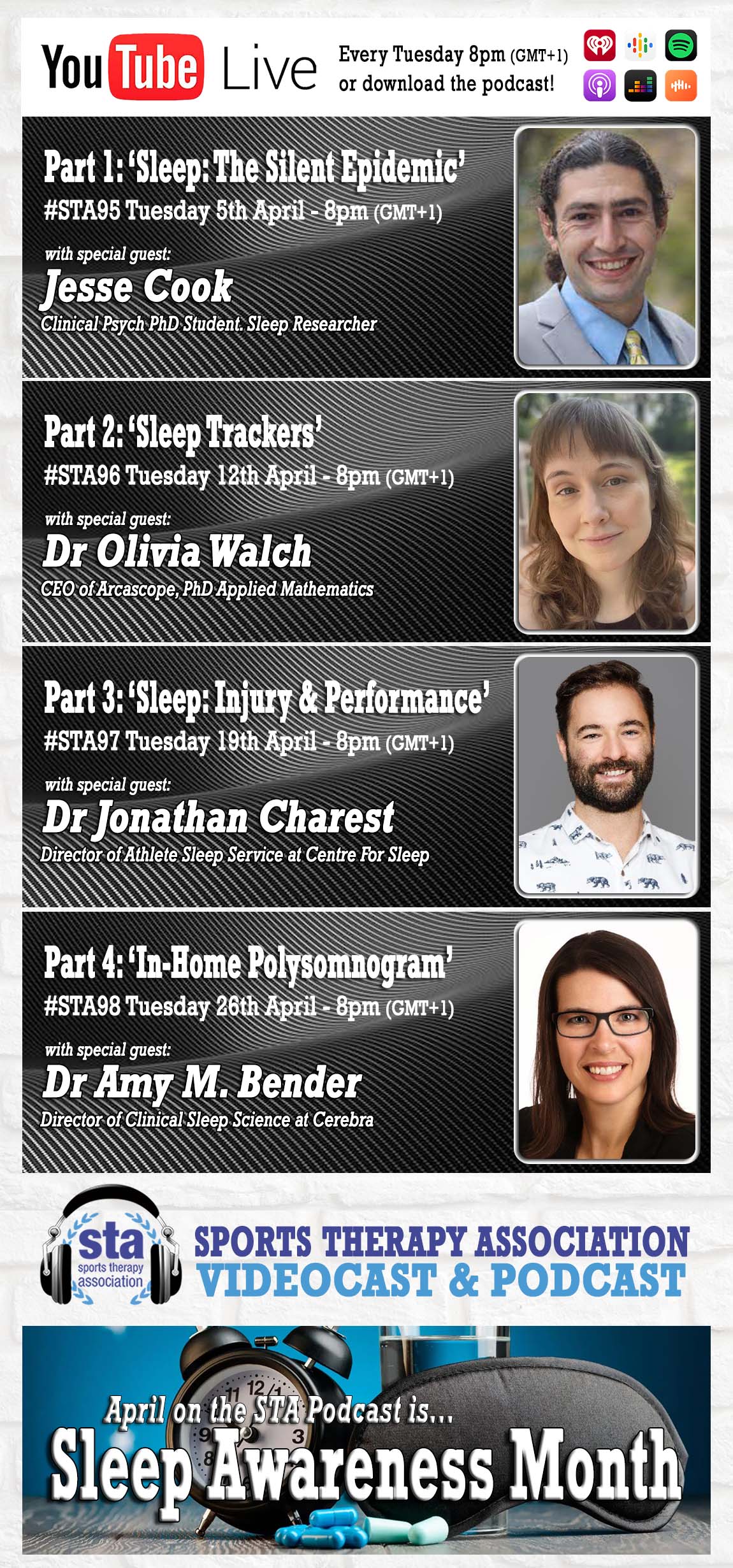
Related Posts
Ready For The Sleep Study Results?
My five week sleep study using Cerebra’s In Home Polysomnogram Sleep System is now over. Read on for details of how to hear the results!
Sleep Quality: Terminology
In examining the relationship between sleep quality/quantity and performance, it is useful to take a look at the terminology commonly used, and appreciate how many of the words & acronyms we commonly see are often misused. In this article we consider REM Sleep, Non-REM Sleep (including deep sleep), the effectiveness of wearables in tracking sleep, chronotypes, circadian rhythms, and whether you are a Lion, Bear, Wolf or Dolphin.
5 Week Cerebra Sleep Study
Familiar with the word ‘polysomnography‘? How about ‘electroencephalography‘? Join me as I embark on a five week sleep study using ‘Cerebra Sleep System’ technology developed by Cerebra, a Canadian company transforming the future of sleep diagnosis and therapy. Thanks to self–applied, polysomnography (PSG) in the comfort of my own home, I’ll be seeing how removing caffeine from my diet affects my sleep quantity & quality.




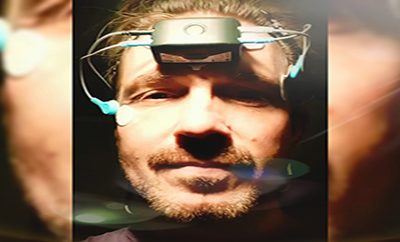
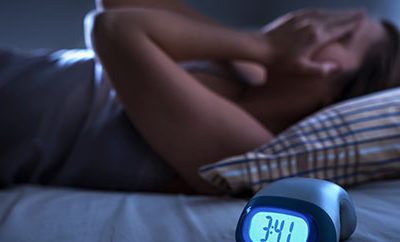
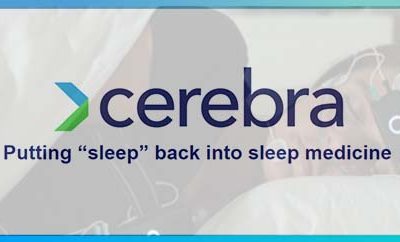
0 Comments